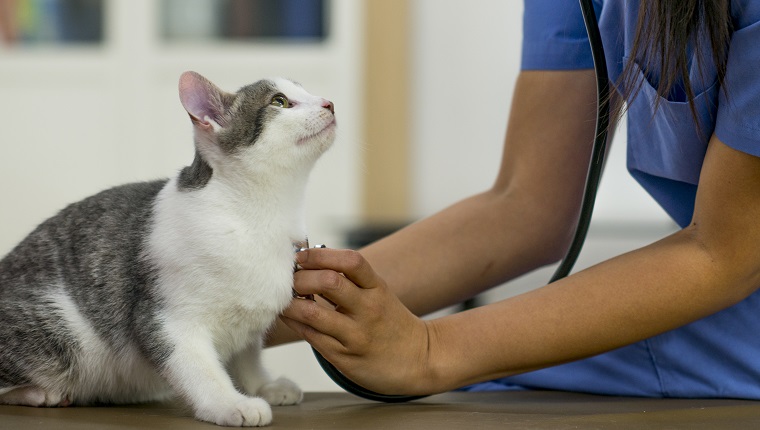Asthma in cats is a condition that’s very much like asthma in humans. It involves a chronic inflammation of the air passageways of a cat’s lungs.
When a cat experiences an asthma attack, it becomes hard for them to breathe. Some studies have estimated that almost five percent of all cats suffer from asthma.
If you see symptoms in your cat, then you must consult your veterinarian right away so they can diagnose and treat the issue. Here’s what you should know about the symptoms, causes, and treatments for asthma in cats.
Symptoms Of Asthma In Cats
Symptoms of asthma in cats mostly relate to breathing issues which you might notice your cat experiencing.
Some of the most common symptoms include:
- Rapid breathing
- Gasping for breath
- Coughing a lot
- Making a wheezing sound while breathing
- Squatting while breathing rapidly
- Lips and gums turning blue
- Generally seeming more tired after physical exertion
Causes Of Asthma In Cats

Asthma in cats is usually attributed to a condition called allergic bronchitis, which can happen when a cat’s lungs become inflamed after they inhale an allergen. When the cat’s immune system responds to the allergen, it can lead to a swelling or irritation of the airways.
Some of the factors that can bring on an asthma attack in a cat include:
- Cigarette smoke
- Dust
- Pollen and grass
- Mold
- A pre-existing heart condition
- Harsh household chemicals
- Obesity
Treatments For Asthma In Cats
If you bring your cat to a veterinarian for asthma, the vet will examine your cat’s breathing and might also order an X-ray of the chest area.
If the vet concludes that your cat does have asthma, one of the main ways of treating it is via corticosteroids, a medication that works to reduce inflammation in the cat’s airways. This can be administered either orally, via injection, or with an inhaler, just like with a human inhaler.
Beyond medication, it’s advisable to make some changes in your cat’s environment to lessen the chances of allergic aggravation. Some common suggestions include:
- Switching to a dust-free litter
- Keeping a clean and smoke-free household
- Making sure rooms are well ventilated
- Avoiding the use of perfumes or aerosols in the home
Have you ever cared for a cat with asthma? What tips do you have for other pet parents with asthmatic cats? Let us know about it in the comments section below!




